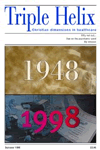5th July marks 50 years of the National Health Service, comprehensive healthcare free at the point of need and associated with comprehensive welfare provision. The title of this editorial is Beveridge's 1942 slogan summing up these ambitious aims.
Before 5th July 1948 hospital doctors 'were worried: about the nationalisation of voluntary hospitals; the loss of influence by the teaching hospitals; a fair distribution of consultant skills; and private practice'. GPs 'feared that the new service would convert them to salaried employees and compromise their clinical independence'.[1]
Perhaps the retrospectoscope suggests some self interest as well as concern for patients? John Marsh's lighthearted reminiscences in this edition reveal how one Christian medical student saw things at the time, but Christian health professionals' main concerns then were not losing clinical or financial freedom, but losing the freedom to work as Christians. They need not have worried. A large medical mission in south London sounded a note of relief early in 1949:
'Since writing our last Annual Report, the National Health Scheme has been launched. We are full of gratitude to the Lord who has been merciful to us in our doubts and anxieties, guiding us in many decisions and allowing the work to emerge as free as it was before the Scheme, contrary to all our fears. We had to face the prospect of great changes, which seemed likely to follow the inception of such an immense piece of social legislation; we dreaded being engulfed and losing our freedom, and in our minds we fought many battles which in the end never occurred . . '
' . . at the clinics, as far as the patients are concerned, the service we are able to give them is the same, with this improvement, that they do not have to pay!'[2]
We now take for granted healthcare free at the point of delivery, and the NHS starts its second half century popular with the people and the professions, but facing many challenges. Grateful that the state largely meets physical needs, Christian health professionals seek to address spiritual needs too.
Elsewhere in this edition, Richard Cook looks at another 50th anniversary piece of legislation, the Children Act of 1948 and its 1989 successor, and chaplain Steve Clark marks 50 years of Burrswood's ministry to the whole person.
'From the cradle to the grave.' Can the secular state afford to keep that going? Can it afford not to? And can Christian health professionals continue to care for the needs of the whole person, not just during that interval but before the cradle and beyond the grave?
































